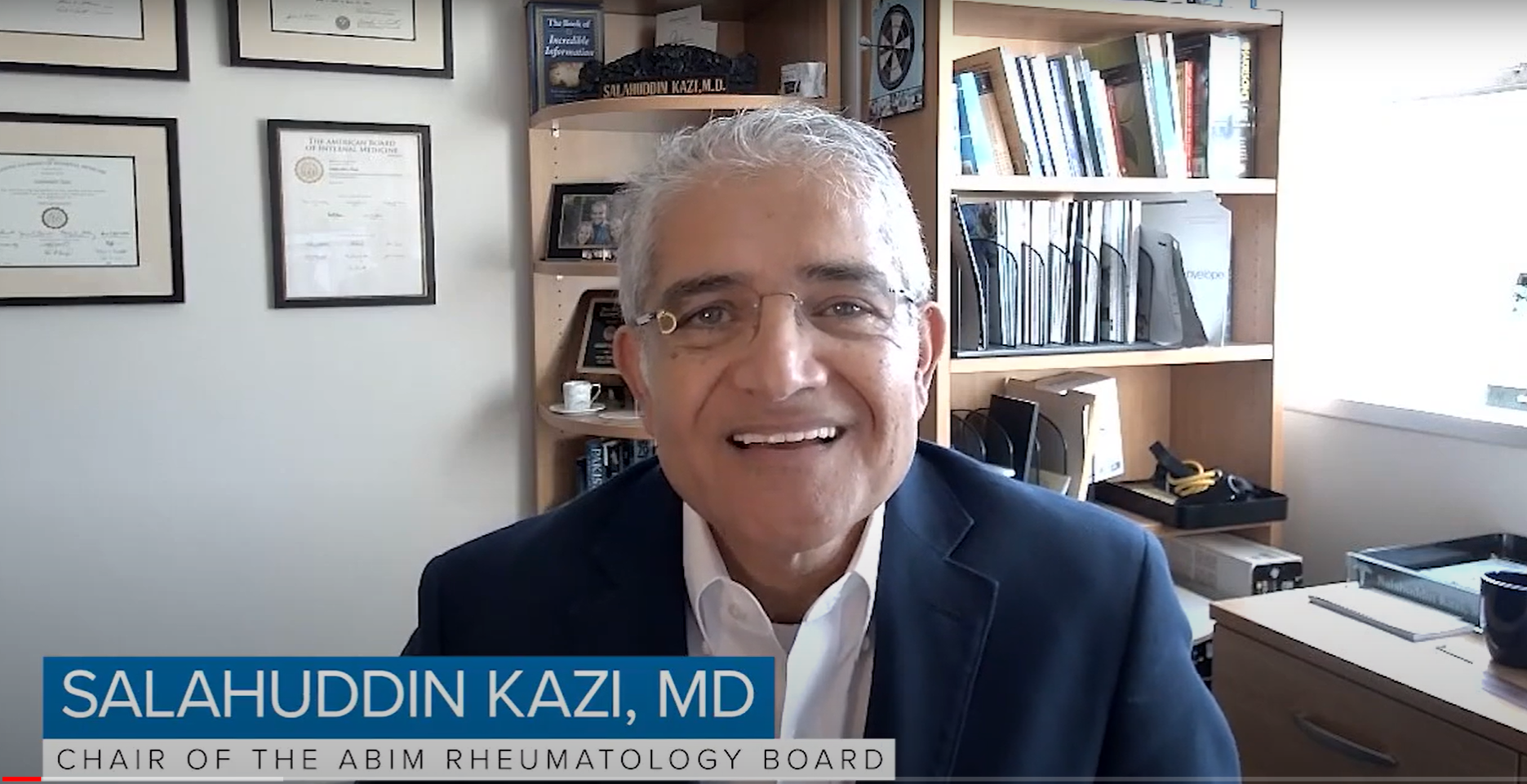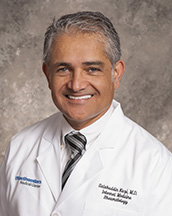

Chair, Rheumatology Board
The Rheumatology Board held its spring meeting on Friday, March 22, 2024. The agenda provided an opportunity to update the Rheumatology Board on activity at ABIM and allowed for discussion of pressing issues in the field. The Specialty Board was joined for a portion of the meeting by guests from the American College of Rheumatology*.
The Rheumatology Board also gratefully acknowledges the service of departing member Carlos M. Gadea, MD, whose term on the Specialty Board ends June 30.
The following is a summary of the spring meeting.
Conversation with the President*
Prior to the meeting, members and guests of the Rheumatology Board had the opportunity to view a recorded video update from Richard J. Baron, MD, MACP, President and Chief Executive Officer (CEO) of ABIM and ABIM Foundation, reflecting on current issues for ABIM and the internal medicine community, including:
- The ongoing collaboration between ABIM and internal medicine societies to address their members’ concerns and feedback about the Maintenance of Certification (MOC) program. More than 30 societies met with ABIM in fall 2023, in addition to ongoing discussions throughout the year. In part, the collaboration also explores the need for focused assessments in select subdomains of specific specialties where enough physicians are focusing their practice. Focused assessments have already launched in sleep medicine and internal medicine, with more to come in the future, including hematology in 2026.
- ABIM’s work to mitigate the spread and negative impact of misinformation for physicians and patients. Most recently, ABIM updated the way it reports certification status for physicians to be more transparent about why some certificates are no longer active, such as being “Revoked,” “Suspended,” or “Lapsed.”
- The establishment of a dedicated innovation team at ABIM to explore how emerging technology and artificial intelligence (AI) can be used to assess physicians in the rapidly evolving context of their requisite skills and practice environments.
- Dr. Baron’s approaching retirement later this year, the Board of Directors’ search for a new CEO and ABIM’s transition to new leadership.
The Rheumatology Board’s discussion focused on the impact of new AI technology on how physicians practice and how it can be used to benefit physicians. Steven Echard, IOM, CAE, Executive Vice President of ACR, noted that AI in general is based on the data used to build the large language models (LLMs), so there will be a need for human-driven research and other uniquely human contributions. Richard G. Battaglia, MD, FACP, Chief Medical Officer for ABIM, shared that the ABIM Board of Directors is thinking broadly about how AI is changing the field of medicine, how it may be used in ABIM’s work as a certifying organization and specifically about the implications of LLMs for assessments like the Longitudinal Knowledge Assessment (LKA®).
The group also discussed ABIM’s work responding to feedback from medical specialty societies. Dr. Battaglia confirmed that ABIM is exploring some changes to the MOC program that will address specific concerns shared by societies while upholding the ultimate goal of the program, which is to give physicians who are staying current in their medical knowledge a way to demonstrate that they are doing so.
ABIM and Physician Feedback*
Though ABIM has long prioritized physician feedback in shaping its programs, the organization has placed renewed emphasis on addressing elements of the certification program that can and should be improved, as well as fostering the community’s perception of the value of certification and physician pride in maintaining certification. Dr. Battaglia gave the Rheumatology Board an overview of recent physician feedback and actions that ABIM is considering, and invited the group to share their ideas and suggestions for ABIM to consider as it continues working with societies, diplomates and the broader internal medicine community.
One of the points mentioned in discussion was the four-minute time limit for questions on the LKA. On average across all specialties representing thousands of physicians, most questions are answered in less than two minutes, or about an hour each quarter for 30 questions. However, ABIM has received feedback that the time limit can create anxiety and is therefore working on solutions to address this. Rebecca S. Lipner, Ph.D., Senior Vice President, Assessment and Research for ABIM, noted that in considering changes to time limits, ABIM must also consider the element of question security and how the timing remains a simulation of practice.
Specialty Board Oversight of Assessments*
Specialty Boards are responsible for reviewing and approving the assessment blueprints and standards for certification, MOC and the LKA in their respective disciplines. Each spring, the Specialty Boards review data related to the population of new graduates entering the discipline, diplomates maintaining their certification, workforce information, and assessment performance trends and feedback. Periodic review of these data helps to inform the Specialty Boards’ assessment decisions. The Rheumatology Board discussed assessment data in the discipline and provided feedback to ABIM staff about which data were most helpful for ongoing oversight of assessment. Some of the data the Specialty Board reviewed are publicly available on ABIM’s website, including:
- Relative distribution of fellows in training per discipline.
- Percentage of first-year fellows who are female by subspecialty.
- Initial certification pass rates by discipline.
- MOC pass rates by discipline.
- Number of candidates certified in each discipline each year.
The group discussed how the downward trend seen in pass rates as a result of the pandemic is reflected across disciplines, which is thought to be due to fewer physicians attending in-person review courses at the height of the pandemic. Similar trends have been identified in other certifying member boards of the American Board of Medical Specialties. They also discussed whether the low percentage of Black diplomates seen in rheumatology is common in other disciplines as well. Dr. Lipner cited a paper recently published on bias against Black, Latino and Asian internal medicine residents in The Annals of Internal Medicine.
Exploring Focused Assessment(s) in the Discipline*
ABIM currently offers focused versions of its assessments in internal medicine (the Internal Medicine: Inpatient LKA and traditional, 10-year MOC exam) and sleep medicine (the Sleep Medicine LKA: Obstructive Sleep Apnea Emphasis). Additional explorations have begun in gastroenterology and hematology with plans announced recently to develop malignant- and classical-focused versions of the Hematology LKA (in addition to the general Hematology LKA) to launch in 2026. ABIM plans to continue exploring the idea of focused assessments in other specialties with stakeholder input at multiple levels, including that of the Specialty Boards, to determine whether focused assessments are appropriate in those disciplines.
In discussion, the Rheumatology Board reached consensus that it would be worthwhile to explore whether the data support focused assessments in rheumatology. Mr. Echard inquired about what to expect from this process. Dr. Lipner explained in more detail how ABIM would be working closely with society partners, surveying the physician community and analyzing the subsequent data.
Society guests departed at this point in the meeting.
Recommendation of Candidates for the Specialty Board to ABIM Council
Each year, ABIM initiates the process to recruit for openings on the Specialty Boards; each member serves a three-year term with the option for one renewal, and positions open on a rolling basis each year. Openings are posted publicly on the website and shared with stakeholder groups. Upon completion of the application process, the Specialty Board chair reviews all applications and asks members of the Specialty Board to conduct candidate interviews and make recommendations. Special attention is paid to the composition of each Specialty Board, such as practice setting and region, career stage, educational background (U.S., international) and race and ethnicity. Final selections are made by the ABIM Council based on the Specialty Board’s top two recommendations.
At the spring meeting, the Rheumatology Board discussed the most recent opening for a rheumatologist practicing in a non-academic community setting for a term beginning July 1, 2024. The opening was posted on ABIM’s website in July 2023 and applications were accepted through mid-September. They discussed the candidates they had interviewed and voted on two to recommend to the Council.
Following this meeting, the Council appointed Amish Dave, MD, MPH, of Virginia Mason Franciscan Health in Seattle, to serve as a new member of the Rheumatology Board starting in July.
Look for emails this summer announcing openings on the Rheumatology Board. Visit ABIM’s website for a full list of current openings.
Update on the Rheumatology Approval Committees
Marcy Bolster, MD, Harvard Medical School and Massachusetts General Hospital; Chair of the Rheumatology LKA Approval Committee
Hilary Haftel, MD, the University of Michigan Medical School; Member of Rheumatology Traditional, 10-Year MOC Exam Approval Committee
ABIM Approval Committees are responsible for approving and editing all assessment content, and maintaining the blueprints for the Initial Certification Examination, the traditional, 10-Year MOC exam and the LKA. There are two Approval Committees in rheumatology: the Traditional, 10-Year MOC Exam Approval Committee (which also approves content for the initial certification exam) and the LKA Approval Committee. Dr. Bolster and Dr. Haftel provided a brief update on the composition of the Approval Committees, work done in recent meetings and the work of the Rheumatology Item-Writing Task Force.
The group briefly discussed how Item-Writers receive feedback from the Approval Committees on items they submit for review, and recent work undertaken to establish a mentorship program and improve response times on item review.
New Ways to Recognize Diplomates for Their Commitment to MOC
ABIM is exploring new ways to recognize physicians who participate in the MOC program. This includes finding new ways to celebrate assessment milestones and ongoing efforts to stay current. Nicole Welk-Joerger, Ph.D., Program Manager of Stakeholder Engagement for ABIM, shared information about the project with the Specialty Board, including a number of proposed tactics for early consideration. Dr. Welk-Joerger invited members to share their feedback and reactions on how diplomates want to be recognized and what forms of recognition are most impactful for physicians.
Members of the Specialty Board offered input about how they and their colleagues often perceive certification as an expectation of physicians rather than something that is awarded, and suggested ideas for more public forms of recognition or acknowledgement that would capture patients’ attention. These ideas included creating materials to display in patient waiting areas, adding information to “verification of certification” webpages and collaborating with organizations that populate online physician profiles.
In Closing
The Rheumatology Board values the feedback and commentary of the entire medical community, including diplomates and society partners.
Do you have any questions? Are you interested in getting involved?
If you have questions after reading this report, please connect with us through the following channels:
- Subscribe to the ABIM blog.
- Call 1-800-441-ABIM (2246).
- Email request@abim.org.
- Join our Community Insights Network to share your feedback.
Join ABIM Governance
The Rheumatology Board has three openings for terms beginning July 1, 2025:
- A rheumatologist practicing in an academic setting
- An early career rheumatologist (with initial certification in Rheumatology within the last 10 years)
- A health care team member (e.g., RN, RRT, APRN, PA, Pharm.D., LSW) with experience working in rheumatology
In addition, the ABIM Council has three openings for terms beginning July 1, 2025:
- An early career physician in any specialty (with initial ABIM certification within the past 10 years)
- A physician practicing in a non-university/community setting
- A patient or caregiver with perspective in internal medicine
Applications are due July 22, 2024, and appointments are expected to be announced in spring 2025.
Openings on ABIM’s Approval Committees will be announced fall 2024. Visit the website for a complete list of current openings.
*Indicates society guests were present for this session.



